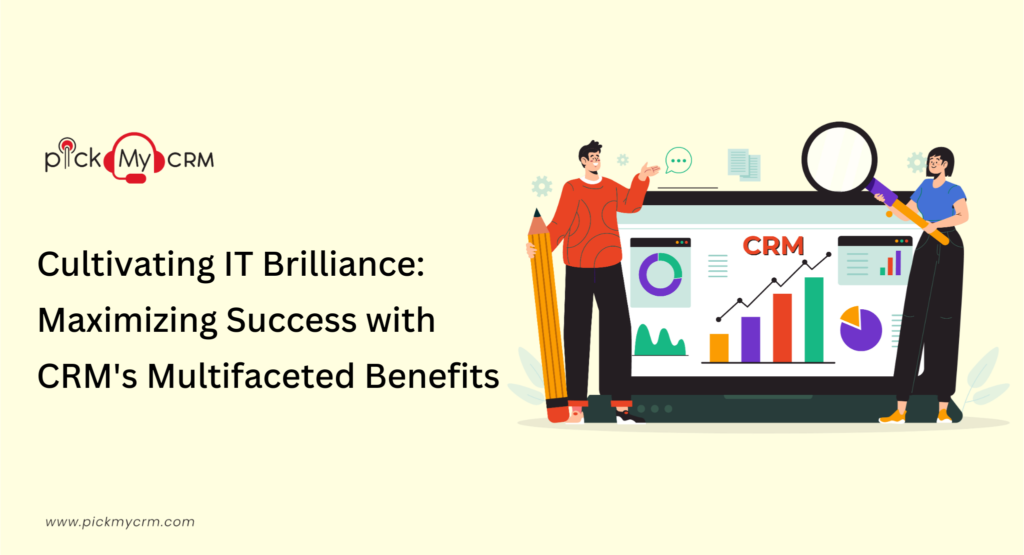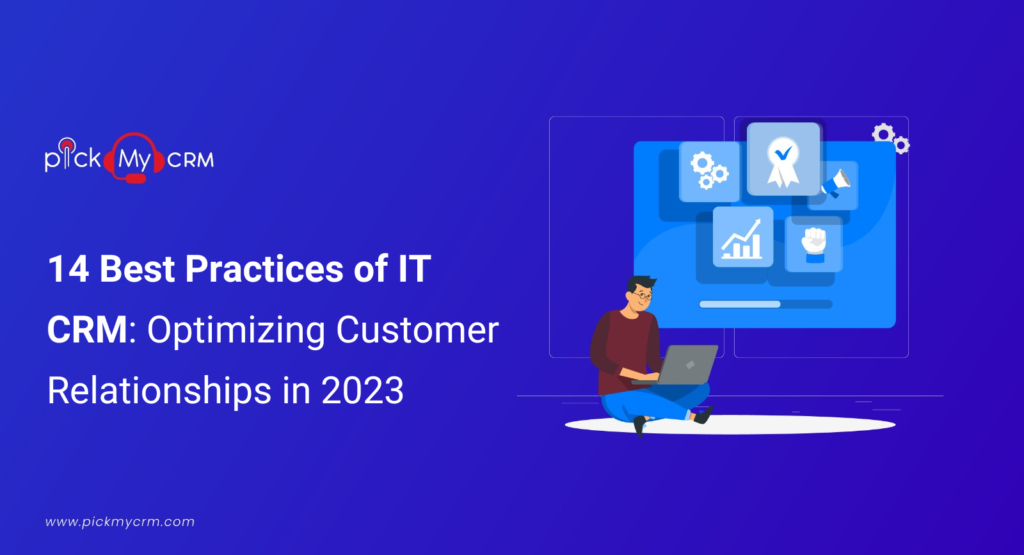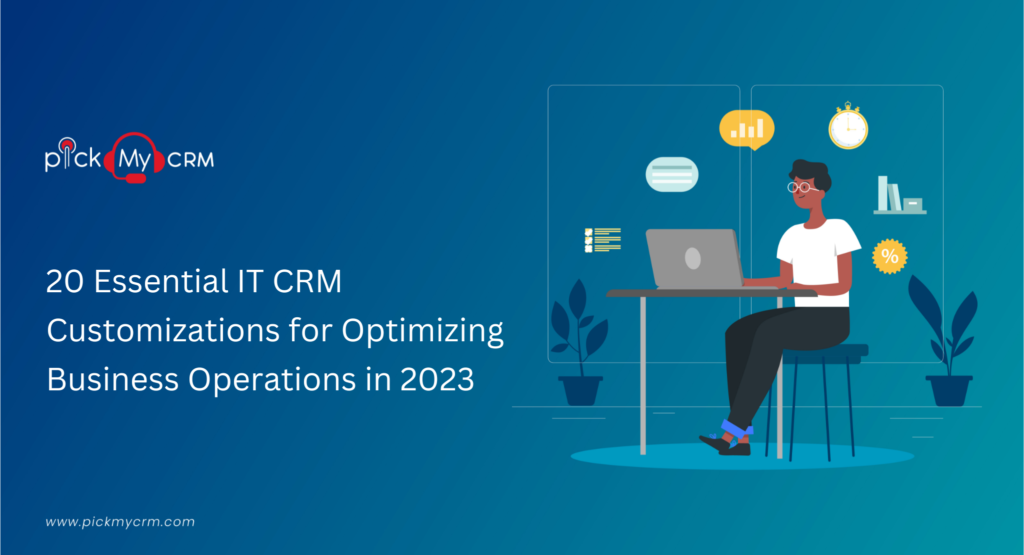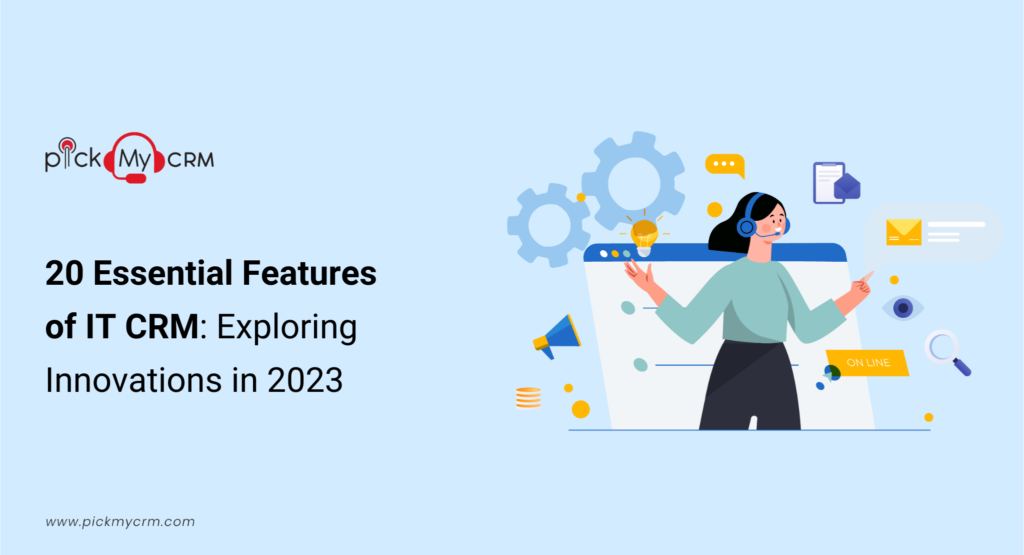The Benefits of IT CRM: Elevating Efficiency and Customer Satisfaction
Top 20 Benefits of IT CRM
Customer Relationship Management (CRM) is a transformative tool in the Information Technology (IT) industry, offering a Myriad of Advantages that cater to diverse aspects of business operations and growth. Here are the comprehensive benefits of CRM for IT companies,Enhanced Customer Understanding
CRM systems gather and organize customer data, providing IT businesses with a holistic view of preferences, purchase history, and interactions. This comprehensive understanding enables companies to tailor their solutions to meet specific client needs, fostering stronger relationships and nurturing customer loyalty.Efficient Communication
With CRM centralizing communication channels, IT teams can collaborate seamlessly. It reduces miscommunication, promotes clarity, and ensures faster project progress. Efficient communication translates into effective teamwork and improved collaboration among teams, departments, and clients.Data-Driven Decisions
CRM platforms offer sophisticated analytics tools that analyze customer data, enabling IT companies to make well-informed decisions about product development, marketing strategies, and resource allocation. By leveraging these insights, businesses can align their efforts with market demands, enhancing their competitive edge.Optimized Lead Management: Precision in Sales
In the fiercely competitive IT landscape, efficient lead management is crucial for success. CRM systems have become indispensable for achieving precision in IT sales. Let's delve into how CRM empowers IT sales teams with the essential tools and strategies to handle leads, transform prospects into loyal customers, and elevate their sales performance.- Lead Tracking and Organization: CRM systematically tracks and organizes leads, Offering a precise insight into the sales pipeline.
- Automated Lead Nurturing: CRM automates lead nurturing, tailoring interactions based on lead characteristics and behaviors.
- Lead Scoring for Prioritization: CRM assigns numerical values to leads based on their conversion potential, allowing for prioritization.
- Improved Lead Conversion Rates: CRM's systematic approach leads to higher lead conversion rates and increased revenue.
- Enhanced Sales Forecasting: CRM enables accurate sales forecasting, optimizing resource allocation.
- Reduced Sales Cycle Times: CRM expedites the sales cycle, improving efficiency and customer experience.
- Continuous Improvement: CRM's reporting and analytics support ongoing process enhancement.
Benefits of Flexible Scalability with IT CRM
During the Expansion of IT companies' customer base, CRM systems seamlessly adjust to meet growing demands. This flexibility guarantees the maintenance of efficient processes and the continuity of customer relationships, even during periods of rapid growth.Personalized Customer Experiences
CRM Provides IT companies the ability to offer customized services and interactions that align with individual client preferences. This personalization results in a distinctive and unforgettable customer experience, fostering elevated Levels of Customer satisfaction and Fostering long-lasting loyalty.Efficient Customer Support: Swift and Effective
- Comprehensive Customer Information: CRM equips customer support teams with extensive customer data, enabling swift issue resolution.
- Proactive Assistance: CRM tools empower support teams to provide preemptive assistance, enhancing customer satisfaction.
- Faster Issue Resolution: With access to comprehensive customer information, support teams can quickly address issues, leading to faster resolutions.
- Improved Customer Satisfaction: Prompt issue resolution and proactive assistance Lead to enhanced customer satisfaction.
- Stronger Brand Image: CRM contributes to a stronger brand image through efficient customer support and problem-solving.
Enhanced Project Collaboration
By centralizing project-related information, CRM promotes better collaboration among IT teams. This centralized strategy Enhances project management, ensuring alignment among all stakeholders and more efficient project deliveries.Data-Backed Analytics
- Data-Driven Decision-Making: CRM provides powerful analytics tools that enable data-driven decision-making in IT companies.
- Customer Behavior Insights: CRM systems offer insights into customer behavior trends and patterns.
- Strategic Planning: These insights help IT companies formulate strategic plans aligned with market trends and customer expectations.
- Precise Resource Allocation: CRM data facilitates the Precise allocation of resources according to customer demand and team capabilities.
Benefits of Increased Patronage with IT CRM
- Leveraging Customer Data: CRM enables IT companies to leverage customer data for personalized interactions and engagement.
- Reducing Churn Rates: Through timely follow-ups and tailored communication, CRM helps reduce customer Churn Rates.
- Strengthening Loyalty: Nurturing existing customer relationships through CRM enhances loyalty, fostering repeat business.
- Sustained Growth: Improved customer retention is the foundation for sustained growth in the IT sector.
- Cost-Efficient: Retaining existing customers is often more cost-effective than acquiring new ones, and CRM supports this strategy.
- Referrals and Advocacy: Satisfied customers become brand advocates, driving referrals and positive word-of-mouth.
Gains from Optimized Resource Management through IT CRM
With CRM Insights, IT firms can allocate resources more effectively. By analyzing customer demand and team capabilities, businesses optimize resource allocation, resulting in higher productivity and better utilization of resources.Automation of Routine Tasks: Liberating Time
- Efficiency Through Automation: CRM systems automate repetitive and time-consuming tasks, freeing up valuable time for IT professionals.
- Focus on High-Value Activities: By handling routine tasks, CRM allows IT teams to concentrate on high-value activities such as innovation and strategic planning.
- Reduced Human Error: Automation Reduces the likelihood of human errors in routine processes, ensuring accuracy.
- Enhanced Productivity: CRM-driven automation enhances overall productivity within IT companies.
- Consistency in Processes: Automation ensures Consistency in processes, even in complex IT projects.
- Time Savings: IT professionals can allocate their time more efficiently and effectively, ultimately driving better outcomes.
Centralized Information Hub: The Repository of Knowledge
In the dynamic IT landscape, access to accurate data is crucial. CRM systems shine as the central information hub for IT companies, ensuring up-to-date knowledge.- Unified Customer Data: CRM consolidates customer data from various sources, providing a comprehensive view.
- Efficient Communication History: CRM maintains a detailed record of customer interactions, streamlining communication.
- Project Management: CRM stores project details, timelines, and progress updates, simplifying project management.
- Knowledge Sharing: CRM promotes knowledge sharing among team members, fostering collaboration.
- Enhanced Customer Service: Centralized data enables prompt and accurate customer support.
- Streamlined Decision-Making: CRM serves as a source of insights for informed decision-making.
- Data Security: CRM systems prioritize data security and compliance, safeguarding customer information.
IT CRM Benefits for Optimized Sales Procedures: Enhancing Income
- Efficient Sales: CRM enhances sales efficiency and effectiveness.
- Optimized Lead Management: CRM systems refine lead tracking and conversion.
- Sales Automation: Automated routine tasks liberate valuable time for more strategic activities.
- Data-Driven Insights: CRM offers insights into customer behavior for better decision-making.
- Higher Conversion Rates: Streamlined processes lead to increased lead conversion and revenue.
- Enhanced Engagement: CRM enables personalized interactions for stronger customer relations.
- Resource Efficiency: Sales teams allocate resources effectively, maximizing revenue.
- Accurate Forecasting: CRM aids in precise sales forecasting for strategic planning.
Benefits of IT CRM in Laser-Sharp Marketing Strategies: Pinpoint Promotion
- Segmentation Capabilities: CRM allows IT companies to segment their customer base for precise targeting.
- Personalized Messaging: Segmentation enables tailored marketing campaigns that resonate with specific customer groups.
- Higher Engagement: Targeted campaigns lead to increased customer engagement and interaction.
- Improved Conversion Rates: Messages are more relevant, resulting in higher conversion rates.
- Cost Efficiency: Targeted marketing is more cost-effective than broad, unfocused campaigns.
- Data-Backed Decisions: CRM provides data-driven insights for informed marketing strategies.
- Customer Retention: Personalized campaigns foster customer loyalty and retention.
- Competitive Advantage: CRM-driven targeted marketing provides a competitive edge in the IT sector.
Benefits of IT CRM in Collaborative Across Functions: Bridging Divisions
- Breaking Down Silos: CRM promotes collaboration by breaking down departmental barriers.
- Shared Access: Team members across departments can access and share crucial customer information.
- Enhanced Communication: Real-time updates and shared access lead to improved interdepartmental communication.
- Efficiency in Projects: Cross-functional collaboration ensures projects run smoothly and efficiently.
- Data-Driven Insights: CRM provides data-backed insights for collaborative decision-making.
- Faster Issue Resolution: Collaboration results in Faster issue resolution and improved customer satisfaction.
- Unified Customer Experience: Customers benefit from a unified and Seamless experience across departments.
- Innovation: Collaboration sparks innovation as diverse perspectives come together to solve challenges.
Real-Time Customer Insights: Staying Ahead
CRM provides real-time updates on customer interactions, allowing IT professionals to stay informed about changes in customer relationships and respond promptly to evolving needs.Enhanced Data Security: Safeguarding Trust
- Data Sensitivity: In the IT sector, safeguarding customer data is paramount due to its sensitivity.
- Compliance Measures: CRM systems implement rigorous compliance measures to meet data privacy regulations.
- Encryption and Access Controls: CRM incorporates encryption and access controls to protect sensitive information.
- Client Trust: Demonstrating a commitment to data security builds trust with clients, a critical factor in the IT industry.
- Competitive Advantage: Robust data security measures can provide a competitive advantage in winning and retaining clients.
- Data Integrity: CRM ensures data integrity, reducing the risk of data breaches and unauthorized access.
Perks of IT CRM in Industry Excellence and Standing Out
- Precise Targeting: CRM provides data-backed insights for highly targeted marketing and services.
- Enhanced Customer Experiences: Personalized interactions and efficient support create satisfied customers who become advocates.
- Efficient Operations: CRM streamlines processes, allowing IT professionals to focus on innovation and strategic planning.
- Agility in Adaptation: Real-time insights enable quick adjustments to market changes and customer needs.
- Data Security: CRM prioritizes data security, building trust with clients.
- Informed Decision-Making: Analytics tools support data-driven Decisions in strategic planning and resource allocation.
- Continuous Improvement: CRM fosters ongoing enhancement of processes and services, ensuring competitiveness.
Strategic Decision-Making: Navigating the Future
CRM insights guide top management in making strategic decisions that align with market trends and customer expectations. It ensures that IT companies remain proactive and responsive to evolving industry dynamics. The benefits of IT CRM for the industry span from personalized customer interactions to streamlined operations, data-driven insights, and growth opportunities. It's a comprehensive tool that empowers IT companies to thrive in a rapidly evolving landscape while delivering exceptional value to their clients.When and Where Should IT Companies Implement CRM?
The ideal time to adopt CRM is now. As IT organizations navigate the complexities of an ever-evolving industry, implementing CRM systems can facilitate seamless growth and innovation. Whether a startup, mid-sized enterprise, or established corporation, the benefits of CRM are applicable across the spectrum.How Does CRM Work Its Magic in the IT Sector?
CRM transforms IT operations by consolidating customer data, streamlining communication, and automating processes. It equips IT teams with actionable insights derived from data analysis, enabling them to make informed decisions and tailor offerings to market demands.Who Benefits from IT CRM?
- Sales Teams: IT CRM optimizes lead management, enabling sales teams to focus on high-potential leads and improve conversion rates.
- Customer Support Teams: CRM provides comprehensive customer information, leading to faster issue resolution and higher customer satisfaction.
- Marketing Teams: CRM enables targeted marketing campaigns by Segmenting customer data, resulting in higher engagement and conversion rates.
- Top Management: CRM offers data-driven insights for informed decision-making, aiding resource allocation and strategic planning.
- Project Managers: CRM streamlines project management by storing project details and facilitating collaboration among team members.
- IT Professionals: CRM automates routine tasks, freeing time for IT professionals to concentrate on high-value activities.
- Customers: CRM enhances the customer experience by providing personalized interactions and efficient support, Leading to increased Satisfaction and loyalty.
- Entire Organization: CRM fosters cross-functional collaboration, dismantling departmental barriers and nurturing innovation.
How to Choose IT CRM>
Wrapping Up: Profound Insights into Benefits of IT CRM
In summary, the myriad benefits of IT CRM make it an indispensable tool in the tech industry's arsenal. It empowers companies to streamline operations, enhance customer experiences, and gain a competitive edge. From efficient lead management to robust data security, CRM serves as the driving force behind the success of IT enterprises, ensuring they not only meet but exceed the demands of the industry. Embracing CRM is not just a choice; it's a strategic imperative for those seeking sustained growth and innovation in the dynamic realm of Information Technology.
[Related Article: How to Choose IT CRM]
FAQs related to Benefits of IT CRM
CRM systems gather and organize customer data, including preferences and interactions. It enables IT companies to provide tailored solutions, fostering stronger relationships based on a deep understanding of individual client needs.
CRM centralizes communication channels, ensuring efficient interactions between teams and departments. It reduces misunderstandings, accelerates project progress, and promotes collaboration for successful project outcomes.
CRM platforms offer analytics tools that extract insights from customer data. This data-driven approach helps IT companies make informed decisions about product development, marketing strategies, and resource allocation, leading to improved business strategies.
CRM automates lead tracking and nurturing processes, allowing sales teams to focus on high-potential leads. It enhances lead conversion efficiency, Resulting in Increased revenue and Improved sales performance.




